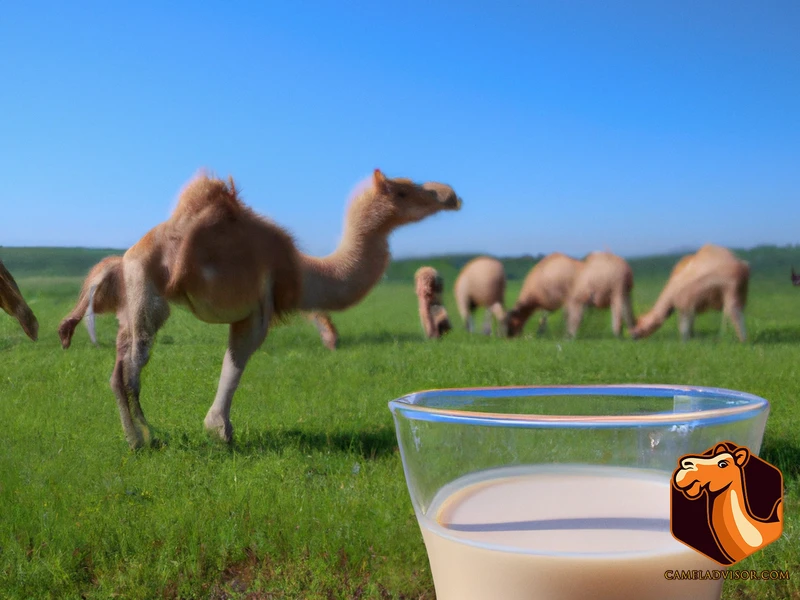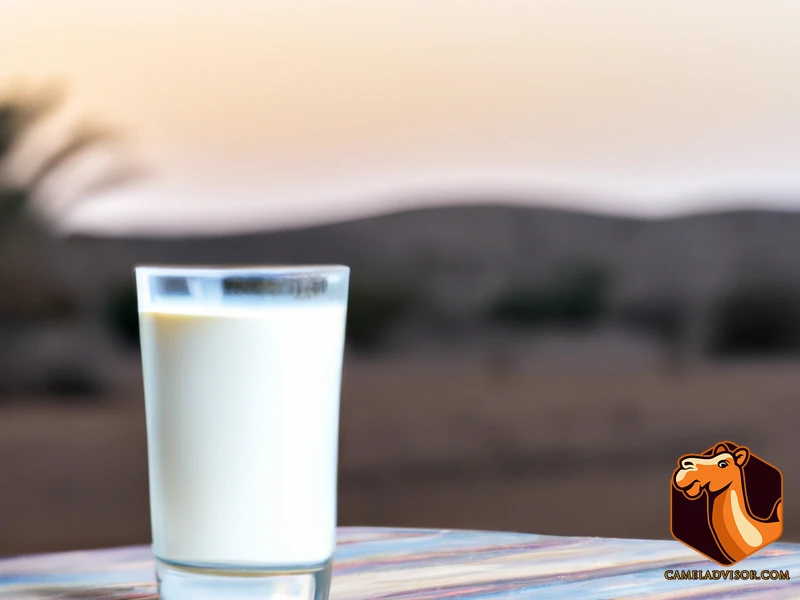As people search for healthier and more nutritious dairy alternatives, a unique option has emerged that may surprise some: hybrid camel milk. This particular type of milk has been used for centuries in certain regions and cultures, and is known for its rich nutritional content and numerous health benefits. But what exactly is hybrid camel milk, and how does it compare to other types of milk? In this article, we’ll explore the history, production, nutritional value, and health benefits of hybrid camel milk, as well as examine the latest research on this fascinating and increasingly popular dairy alternative.
Contents
What is Hybrid Camel Milk?

When it comes to milk, there are various types available in the market, including cow’s milk, goat’s milk, and even buffalo milk. However, one type of milk that has been gaining attention lately is hybrid camel milk. This particular type of milk is a result of crossbreeding between different breeds of camels. The process of producing hybrid camel milk is relatively new and not yet widely known. If you want to learn more about hybrid camel milk, you can check out our guide on hybrid camel breeding to gain a better understanding of this fascinating topic.
History of Hybrid Camel Milk
The history of hybrid camel milk dates back to the 19th century, when camel breeds of different species were crossbred to produce hybrid camels. This crossbreeding process was aimed at producing camels that had desirable traits, such as high milk production, larger body size, and increased resistance to diseases and harsh weather conditions.
One of the earliest recorded instances of crossbreeding camels happened in the early 1800s, when Bactrian and dromedary camels were bred together in India. The purpose of the crossbreeding was to produce a hybrid camel that had the best qualities of both species – the strength of the Bactrian camel and the high milk yield of the dromedary.
Since then, crossbreeding programs have been carried out in different parts of the world. For example, in Kazakhstan and Turkmenistan, crossbreeding of the two-humped Bactrian camel and the one-humped dromedary started in the 1930s. In these countries, the hybrid camels have been found to be highly adaptable to their natural environment, which is characterized by arid and cold climatic conditions.
In recent years, there has been increasing interest in hybrid camels due to their potential benefits in areas such as agriculture, tourism, and climate change adaptation. Some researchers have suggested that hybrid camels could be a valuable asset for farmers, especially those in arid and semi-arid regions, as they tend to produce more milk and meat compared to purebred camels. Additionally, hybrid camels are believed to be better equipped to handle changing weather patterns and erratic rainfall associated with climate change.
Source: https://www.frontiersin.org/articles/10.3389/fmars.2020.00189/full
How is Hybrid Camel Milk Produced?
Hybrid camel milk is produced by crossing domesticated Bactrian camels (Camelus bactrianus) with dromedary camels (Camelus dromedarius). This is done to create a hybrid with a higher milk yield than either parent species, while retaining the hardiness and adaptability of both. The breeding process is carefully controlled and involves selecting the best animals from both species for breeding.
Once the hybrid calves are born, they are nursed by their mother for the first few months. Afterward, they are separated from their mother and fed on a milk replacer diet made from a blend of cow’s milk, camel milk, and other ingredients to ensure they receive the necessary nutrients for growth and development.
To obtain the hybrid camel milk, the camels are milked twice a day, usually early in the morning and late in the afternoon. The milking process is done by hand or by using milking machines, and the milk is immediately chilled to prevent it from spoiling. The milk is then stored in containers until it is transported to processing plants or markets.
The production of hybrid camel milk presents some advantages. For example, hybrid camels have better milk production than their parent species, and they are hardy and can adapt to different climates and environments, making them a good choice for milk production in arid and semi-arid regions. However, the production of hybrid camel milk also presents some challenges. For example, obtaining camel milk can be a time-consuming and labor-intensive process, and the milk yield can vary depending on a variety of factors, including the age and health of the animal, the climate, and the season.
If you’re interested, you can read more about the evolution of hybrid camels and how they adapt to climate change, the advantages and challenges of raising hybrid camels, the basics of hybrid camel breeding, the potential of hybrid camels in tourism and agriculture, and the market for hybrid camel products using the links below.
– Evolution of Bactrian to Hybrid Camels via Hybridization
– Hybrid Camels: Adaptation to Climate Change
– Advantages and Challenges of Raising Hybrid Camels
– The Basics of Hybrid Camel Breeding
– The Future of Hybrid Camels in Tourism
– The Market for Hybrid Camel Products: A Guide for Buyers and Investors
– Hybrid Camels in Agriculture: 5 Benefits
Nutritional Value of Hybrid Camel Milk
When it comes to alternative milk options, hybrid camel milk may not be the first one that comes to mind. However, this unique milk has recently gained attention for its impressive nutritional value. Rich in protein, vitamins, and minerals, hybrid camel milk offers a host of health benefits. Let’s take a closer look at what makes this milk so nutritious.
Protein and Amino Acids
Hybrid camel milk is a rich source of protein and amino acids, which are essential nutrients needed by the body for various physiological functions. A 100 ml serving of hybrid camel milk contains approximately 3.5 grams of protein, which is higher compared to cow milk.
Here are some essential amino acids found in hybrid camel milk:
- Lysine: This amino acid is essential for growth and tissue repair.
- Leucine: It plays an important role in stimulating muscle protein synthesis and preventing muscle breakdown.
- Methionine: This amino acid is required for the production of other amino acids in the body and also serves as an antioxidant.
- Cysteine: It is a precursor to glutathione, an important antioxidant that helps protect the body from oxidative stress.
- Arginine: This amino acid is involved in various physiological functions, including wound healing, immune function, and hormone secretion.
In addition to these essential amino acids, hybrid camel milk also contains non-essential amino acids, such as proline, glycine, and alanine. These non-essential amino acids are also important for the body and play a crucial role in maintaining various physiological functions.
The protein in hybrid camel milk is also considered to be of high quality, as it contains all the essential amino acids in the right proportion. The protein in hybrid camel milk is more easily digestible compared to other sources of protein, such as cow milk. This makes hybrid camel milk an ideal choice for individuals who have difficulty digesting protein or have certain medical conditions that require a high-protein diet.
Vitamins and Minerals
Hybrid camel milk is an excellent source of vitamins and minerals that are essential for optimal health. Here are some of the key vitamins and minerals present in hybrid camel milk:
- Vitamin C: This vitamin is important for maintaining a strong immune system, as well as for the formation of collagen, which is essential for healthy skin and joints.
- Vitamin D: Hybrid camel milk is also a good source of vitamin D, which is necessary for the absorption of calcium and phosphorus. This vitamin is essential for maintaining strong bones and teeth.
- Vitamin B12: This vitamin is important for the formation of red blood cells, as well as for the proper functioning of the nervous system.
- Calcium: Hybrid camel milk is a rich source of calcium, which is essential for maintaining strong bones and teeth, as well as for proper muscle and nerve function.
- Phosphorus: This mineral is important for the formation of strong bones and teeth, as well as for the proper functioning of the kidneys, muscles, and nerves.
- Potassium: Hybrid camel milk is also a good source of potassium, which helps to regulate blood pressure and maintain proper heart function.
- Zinc: This mineral is important for the immune system, as well as for wound healing and the proper functioning of the senses of taste and smell.
Incorporating hybrid camel milk into your diet can be a great way to ensure that you are getting all of the essential vitamins and minerals that your body needs to stay healthy and strong.
Fat and Cholesterol
Hybrid camel milk is a rich source of fat and cholesterol, which are essential for the human body. The fat content in camel milk is higher than that of cow milk, making it a good source of energy. The fat in hybrid camel milk is composed of both saturated and unsaturated fatty acids. Saturated fatty acids are associated with an increased risk of heart disease and other health problems. However, the type of saturated fatty acids found in camel milk are different from those in cow milk and may have a different impact on health.
On the other hand, unsaturated fatty acids like omega-3 and omega-6 play a vital role in maintaining good health. These fatty acids are not produced by the body and must be obtained from dietary sources. Hybrid camel milk is a good source of these essential fatty acids, making it an important part of a balanced diet.
Hybrid camel milk is also a good source of cholesterol, which plays an essential role in many bodily functions, including cell membrane integrity, hormone production, and nerve function. Despite the common misconception that cholesterol is harmful, it is necessary for the body in moderate amounts. The cholesterol in camel milk is within a healthy range, and research suggests that it may not have the same negative impact on blood cholesterol levels as saturated fatty acids.
However, it is important to note that excessive consumption of saturated fats and cholesterol may increase the risk of heart disease and other health problems. It is recommended to consume hybrid camel milk in moderation as part of a balanced diet.
Health Benefits of Hybrid Camel Milk

When it comes to the health benefits of hybrid camel milk, the list seems never-ending. Not only does it have a rich nutritional profile, but it also provides several medicinal properties essential for maintaining optimal health. From boosting the immune system to enhancing digestion, hybrid camel milk has a unique set of health benefits that are yet to be explored. So, let’s dive deeper into the incredible world of hybrid camel milk and discover what makes it so special.
Boosts the Immune System
Hybrid camel milk has been found to have immune-boosting properties, thanks to its high levels of proteins and immunoglobulins. Immunoglobulins are antibodies that are vital for our immune system’s defense mechanism. They work by identifying and neutralizing toxins, bacteria, and viruses, preventing them from causing harm to the body.
Camel milk, including hybrid camel milk, is rich in immunoglobulins, particularly IgG and IgA. These types of immunoglobulins are essential for the prevention of infections and provide immediate immunity. They help transport essential nutrients and trace elements to newborns and children, enhancing their immunity.
The presence of Lactoferrin in hybrid camel milk also helps enhance the immune system. Lactoferrin is an iron-binding protein that’s found in milk, and it has been studied for its antimicrobial, antiviral, and anti-inflammatory capabilities. It works by depriving harmful bacteria of the iron they need to thrive, thereby inhibiting their growth and proliferation.
Research has also shown that hybrid camel milk helps promote the growth of beneficial bacteria in the gut, which can also boost the immune system. The gut, after all, is home to a significant proportion of our immune cells, and maintaining good gut health is critical for optimal immune function.
Including hybrid camel milk in your diet can help boost your immune system and keep you healthy.
Enhances Digestion
The consumption of hybrid camel milk has been found to enhance digestion due to the presence of several components that aid in the digestive process. Here are some of the ways in which hybrid camel milk enhances digestion:
- High in Probiotic Bacteria: Hybrid camel milk contains a high amount of probiotic bacteria, which are beneficial bacteria that live in the gut and aid in digestion. These bacteria can improve gut health by helping the body break down food and absorb nutrients more efficiently.
- Rich in Enzymes: This milk is rich in enzymes that break down macronutrients like proteins, carbohydrates, and fats, making them more easily digestible. This can lead to a reduction in digestive discomfort and bloating.
- Lactose Intolerance: People who are lactose intolerant may be able to tolerate hybrid camel milk better than cow’s milk. This is because hybrid camel milk contains less lactose than cow’s milk. Lactose intolerance is caused by the inability to digest lactose, a sugar found in milk.
- Anti-inflammatory Properties: Hybrid camel milk is known for its anti-inflammatory properties, which are beneficial for those with digestive disorders like irritable bowel syndrome (IBS) or inflammatory bowel disease (IBD). These conditions can cause inflammation in the digestive system, leading to discomfort and pain.
The consumption of hybrid camel milk can enhance digestion due to its probiotic bacteria, enzymes, and anti-inflammatory properties. It may also be a suitable alternative for those with lactose intolerance.
Provides Anti-inflammatory Properties
One of the health benefits of hybrid camel milk is that it provides anti-inflammatory properties to the body. Inflammation is a natural response of the body to injury or infection, but chronic inflammation is linked to several diseases such as obesity, diabetes, cancer, and heart disease.
Studies have shown that camel milk contains compounds that have anti-inflammatory properties, such as lactoferrin and immunoglobulins. Additionally, it has been found to contain high levels of antioxidants, which can help reduce inflammation in the body.
In a study conducted by El-Agamy and colleagues in 2011, it was found that camel milk has a potent anti-inflammatory effect on carrageenan-induced paw edema in rats. This suggests that camel milk has a potential therapeutic effect on inflammatory diseases.
A study published in the International Journal of Pharmacology in 2018, investigated the anti-inflammatory effect of camel milk on rheumatoid arthritis in rats. The results showed that camel milk had a significant anti-inflammatory effect, reducing the paw edema and arthritic scores.
The anti-inflammatory properties of hybrid camel milk make it a potential therapeutic option for people suffering from inflammatory diseases. Additionally, it may also aid in post-workout recovery by reducing muscle inflammation.
Below is a table outlining some of the anti-inflammatory compounds found in hybrid camel milk:
| Compound | Function |
|---|---|
| Lactoferrin | Anti-inflammatory and antioxidant |
| Immunoglobulins | Anti-inflammatory immunity proteins |
| Antioxidants | Reducing oxidative stress and inflammation |
Incorporating hybrid camel milk into your diet may provide potent anti-inflammatory properties, helping to reduce chronic inflammation and potentially prevent inflammatory-related diseases.
Enhances Heart Health
Hybrid Camel Milk is not only delicious but also beneficial for our health in many ways including enhancing heart health. This is because of its low-fat content and high levels of unsaturated fatty acids which can result in lower LDL (bad) cholesterol levels.
Here are some of the ways that Hybrid Camel Milk can enhance heart health:
- Reduces the Risk of Cardiovascular Diseases: Several studies have suggested that consuming camel milk can significantly lower the risk of cardiovascular diseases by improving the lipid profile and reducing the oxidative stress markers in the body.
- Regulates Blood Pressure: Camel milk is rich in potassium which plays a crucial role in regulating blood pressure. Adequate potassium intake can help to reduce the risk of hypertension which is a major risk factor for heart disease.
- Prevents Atherosclerosis: Atherosclerosis is a condition in which the arteries become clogged by the buildup of fatty substances. This can lead to an increased risk of heart attack and stroke. The high levels of unsaturated fatty acids in camel milk can help to prevent the development of atherosclerosis by reducing the levels of LDL (bad) cholesterol in the bloodstream.
Incorporating Hybrid Camel Milk into your diet can be a simple yet effective way to enhance heart health and reduce the risk of heart diseases. It is a healthy and nutritious alternative to regular cow’s milk and offers many more benefits than just improving heart health.
Researchers’ Insights
As we delve deeper into the world of hybrid camel milk, it’s essential to understand the research that has been conducted on this unique dairy product. With its recent rise in popularity, researchers are beginning to take a closer look at the potential health benefits of consuming this milk. The findings they’ve uncovered so far are nothing short of fascinating. Let’s explore some of the latest insights and discoveries surrounding hybrid camel milk.
Studies on Hybrid Camel Milk
Research on hybrid camel milk has gained momentum in recent years thanks to its novel properties and functionality. Below are some of the recent studies conducted on hybrid camel milk:
- A study published in the Journal of Food Science and Technology investigated the effect of hybrid camel milk on blood glucose and lipid levels in diabetic rats. The study found that consuming hybrid camel milk significantly decreased blood glucose and triglyceride levels in diabetic rats.
- Another study published in the Journal of Dairy Research evaluated the properties of hybrid camel milk in comparison to cow milk. The researchers found that hybrid camel milk had a higher protein and vitamin C content than cow milk. It also contained a higher amount of beneficial unsaturated fatty acids.
- There has also been research conducted on the bioactive peptides found in hybrid camel milk. These peptides have been found to have anti-inflammatory and antimicrobial properties, which could potentially make them useful for treating certain diseases and infections.
- Finally, a study published in the Journal of Dairy Science evaluated the use of hybrid camel milk in the production of yogurt. The researchers found that hybrid camel milk produced yogurt with a higher nutritional value and better sensory properties than cow milk yogurt. The yogurt also had a longer shelf life.
These studies provide evidence of the potential health benefits and functionality of hybrid camel milk. Further research is needed to fully understand the properties and benefits of this unique type of milk.
Comparison with Cow Milk
When it comes to comparing hybrid camel milk and cow milk, there are several differences to consider. Here are some key differences to keep in mind:
- Nutritional value: Hybrid camel milk has been found to have a higher nutritional value than cow milk in terms of protein, calcium, iron, and vitamin C. It also contains lower levels of lactose, making it easier for individuals with lactose intolerance to digest.
- Fat content: Camel milk contains less fat than cow milk, making it a good choice for individuals looking to reduce their fat intake. However, it still contains enough fat to provide a creamy taste and texture.
- Cholesterol: Camel milk has been found to contain lower levels of cholesterol than cow milk, making it a healthier option for individuals concerned about their cholesterol levels.
- Antibacterial properties: Research has shown that camel milk contains antibacterial peptides, which can help prevent the growth of harmful bacteria in the body. Cow milk does not contain the same antibacterial properties.
- Taste: The taste of camel milk has been described as slightly sweet and salty, with a creamier texture than cow milk. It may take some getting used to for individuals who are accustomed to the taste of cow milk.
While cow milk is still the most common type of milk consumed around the world, hybrid camel milk offers several nutritional and health benefits that make it a worthwhile alternative for individuals looking to switch things up.
How to Incorporate Hybrid Camel Milk into Your Diet?
Incorporating hybrid camel milk into your diet can be a great way to obtain its numerous health benefits. However, due to its unique taste and texture, some people may find it difficult to consume. Here are some tips for including hybrid camel milk in your daily diet:
1. Drink it Plain: One of the easiest ways to consume hybrid camel milk is to drink it plain. It has a slightly sweet and nutty taste which may take some getting used to, but can be quite delicious once acquired.
2. Add it to Your Tea and Coffee: Hybrid camel milk can be a great alternative to traditional dairy milk in your tea and coffee. It has a creamier texture and adds a distinct taste to your beverages.
3. Use it in Smoothies: You can add hybrid camel milk to your favorite smoothie recipe for an added nutritional boost. Its high protein and mineral content make it a great addition to a post-workout drink.
4. Cook with it: Hybrid camel milk can be used in a variety of recipes, from soups and curries to baked goods. Its unique taste adds a new dimension to your dishes.
5. Mix it with other Beverages: You can mix hybrid camel milk with other beverages such as almond milk, coconut milk, or even fruit juices for a delicious and nutritious drink.
It is important to note that hybrid camel milk should be consumed in moderation, just like any other food. While it has numerous health benefits, excessive consumption can lead to unwanted consequences. So, try incorporating it into your diet in moderation and see the benefits for yourself.
Conclusion
In conclusion, hybrid camel milk is an incredibly nutritious beverage with numerous health benefits. Its unique combination of vitamins, minerals, amino acids, and fatty acids make it a powerful addition to any diet. The high levels of immunoglobulins and antimicrobial proteins in hybrid camel milk make it a potent booster of the immune system, improving overall health and reducing the risk of infection. Furthermore, its anti-inflammatory properties can help alleviate symptoms of chronic illness and improve heart health.
Hybrid camel milk is also an excellent option for those with lactose intolerance or dairy allergies, as it contains significantly less lactose and different proteins than cow’s milk. Its easy digestibility and bioavailability also make it an ideal choice for those looking for a natural source of protein and nutrients.
Thanks to research conducted on hybrid camel milk, we now have a better understanding of its nutritional properties and potential health benefits. While cow’s milk remains the more popular choice in many regions of the world, the unique combination of nutrients found in hybrid camel milk make it a promising alternative for promoting health.
Incorporating hybrid camel milk into your diet is simple and easy, and it can be enjoyed in a variety of ways, including as a beverage, in coffee or tea, or as an ingredient in a variety of recipes. Whether you’re looking to boost your immune system, improve digestion, or simply increase your daily nutrient intake, hybrid camel milk is an excellent choice that is definitely worth trying.
Frequently Asked Questions
Question 1?
What makes hybrid camel milk different from regular camel milk?
Answer
Hybrid camel milk is produced by cross-breeding a Bactrian camel with a dromedary camel, resulting in a milk that has a different composition and flavor than regular camel milk.
Question 2?
How does hybrid camel milk compare to cow milk in terms of nutrition?
Answer
Hybrid camel milk has a higher content of protein and certain vitamins and minerals compared to cow milk, but has lower levels of fat and cholesterol.
Question 3?
Is hybrid camel milk safe for people with lactose intolerance?
Answer
Hybrid camel milk does contain lactose, so individuals with lactose intolerance may experience discomfort or symptoms after consuming it.
Question 4?
Can hybrid camel milk be used as a substitute for regular milk in recipes?
Answer
Yes, hybrid camel milk can be used as a substitute for regular milk in recipes, and may add a unique flavor and nutritional value.
Question 5?
Is hybrid camel milk readily available in grocery stores?
Answer
Hybrid camel milk may not be readily available in grocery stores, as it is a relatively new product and can be difficult to produce.
Question 6?
Does hybrid camel milk have any unique health benefits?
Answer
Yes, hybrid camel milk has been shown to have anti-inflammatory properties and may enhance heart health and digestion.
Question 7?
How long does hybrid camel milk typically last?
Answer
Hybrid camel milk can last for up to two weeks in the refrigerator, but should be consumed within a few days after opening.
Question 8?
Is hybrid camel milk organic?
Answer
Whether or not hybrid camel milk is organic can depend on the production methods and certification of the farm or company producing it.
Question 9?
How much does hybrid camel milk cost compared to regular milk?
Answer
Hybrid camel milk can be more expensive than regular milk due to the cost of production and limited availability.
Question 10?
Are there any environmental benefits to producing hybrid camel milk?
Answer
Hybrid camel milk production can be more sustainable and eco-friendly compared to traditional dairy farming, as camels require less water and food to produce milk.







